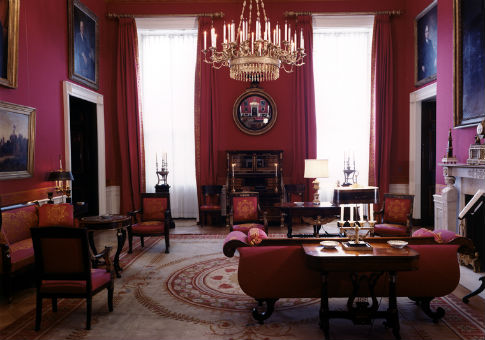Lyndon Johnson had strong views about his showers. One unfortunate White House plumber was sent to the hospital due to a nervous breakdown after years of working to provide Johnson with a shower that met his exacting specifications regarding heat and water pressure. Thousands of dollars were spent on all this, yet Johnson still walked the halls at night to ensure that lights were turned off in every room so that no electricity was wasted in the president’s official residence.
LBJ was the most peculiar modern occupant of the Oval Office. He was a foul mouth who "would sit like a king with four sets in a row watching himself on TV." He rattled off orders from the toilet, undressed in front of the help without hesitation, and required someone else to clip his nails, wash his feet, and provide a daily massage. A former high school teacher, he would dole out grades of the staff’s performance.
The Residence, Kate Anderson Brower’s absorbing history of the modern White House staff from the Kennedy administration to the present, is full of such details. Much of Brower’s material is light hearted. It is amusing to see Nixon getting drunk and bowling with Frankie Blair, one of the White House dish washers, till two in the morning, Carter’s pothead sons toking it up, George H.W. Bush playing horseshoes with his butler, his son playing practical jokes on the maids, and Obama clearing his schedule the day he finds out the White House basketball court was completed.
There is some dirt, however. From Kennedy’s assassination to the day Richard Nixon became the first, and so far the only, president to resign, the staff has always helped the most public family in the world during their most private difficulties. Brower’s account of the atmosphere in the White House while the Clintons suffered their various public embarrassments is engrossing. Profanity-laced screaming matches were common. Hillary is said to have once thrown either a book or lamp at Bill, cutting his head and forcing him to get stitches.
After the Lewinsky affair came to light, Bill was forced to sleep on a sofa for three to four months. Think about that: the POTUS was in the doghouse, and, like every other American male in trouble with his wife, he slept on the couch.
The White House was under a constant state of panic with the Clintons in charge. Their time was unpredictable, often breaking protocols of the House. What Brower calls their "obsession" with secrecy exasperated the staff. Skip Allen, for many years the White House usher, calls them "about the most paranoid people I’d ever seen"; another longtime staffer, Chris Emery, was fired due to his close relationship with Barbara Bush. The Clintons installed a new phone system to make sure no one could eavesdrop on their phone calls, compromising the security of the phone lines.
Each president is different, and adjusting to the new boss’s style requires great flexibility. The Kennedys, Bushes, and Reagans were very personable with the staff while the Nixons, Clintons, and Obamas shared a more professional relationship with White House employees.
The process preparing for a new first family begins 18 months before they move in, which means that as I write this they are already thinking of the president who will succeed Obama. Before the Iowa caucus, before all the candidates have officially announced their bids, before the first vote is cast or the first debate held, the staff researches their potential new bosses.
Presidents come and go, but the White House residence staff will always be there. Many members of the staff have become fixed institutions in the White House, witnesses, in their small way, to history.
With the gravity of the residence’s service come challenges to which few others will be able to relate. Sixteen-hour days are common. Superiors are demanding, yet the staff accept less pay than they might receive elsewhere for the privilege of serving the president and, in doing so, their country. The residence is the one constant in the rapidly changing world of politics.
Brower does a fine job balancing our natural interest in the intrigues of the first families with the rarer and perhaps even more engaging lives of the residence staff. Reading this book, I found myself full of respect for these men and women, all of them proud of their work, regardless of their titles, serving the world’s most powerful politicians.
That pride is one that all Americans share, not just in one 55,000 square foot building, but in our nation as a whole. The White House is America’s House. Brower’s pages open the door to it.
